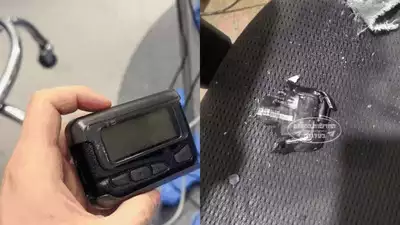A new series of explosions in Lebanon has killed at least 20 people and injured more than 450. The blasts targeted Hezbollah’s walkie-talkies, in what some are calling a possible war crime. The attacks follow similar explosions the day before, which targeted pagers used by the group, killing 12 and injuring over 2,800. Many international observers are warning that these actions could spark a wider conflict between Israel and Hezbollah.
Targeted Explosions on Hezbollah Devices
On Wednesday, explosions hit Hezbollah communications equipment, including walkie-talkies, across Lebanon. This followed the previous day’s explosions of pagers used by the group. According to a Hezbollah source, their walkie-talkies were specifically targeted. Security experts say that although the explosions were small, the impact was widespread, causing chaos and injuries in several cities.
International Outcry and Concerns of a War Crime
The United Nations and other international bodies have condemned the attacks. António Guterres, the UN Secretary-General, said that targeting these devices could be a prelude to a larger Israeli military operation against Hezbollah. He warned both Hezbollah and Israel to show restraint, as the UN Security Council prepares to meet and discuss the situation.
The United Nations and other international bodies have condemned the attacks. António Guterres, the UN Secretary-General, said that targeting these devices could be a prelude to a larger Israeli military operation against Hezbollah. He warned both Hezbollah and Israel to show restraint, as the UN Security Council prepares to meet and discuss the situation.
Volker Türk, the UN High Commissioner for Human Rights, expressed concern over the attacks. He noted that indiscriminate targeting of devices without knowing who is carrying them violates international human rights and humanitarian law. Human Rights Watch also criticized the strikes, calling them a breach of laws that prohibit the use of booby traps in civilian areas.
Israel’s Response and Shifting Focus
Though Israel has not officially claimed responsibility for the explosions, Israeli Prime Minister Benjamin Netanyahu praised Israeli intelligence for its “great achievements.” He hinted that the attacks might be part of a broader strategy. Netanyahu stated that Israel’s goal is to secure the north and allow displaced residents to return home safely.
Israeli Defense Minister Yoav Gallant confirmed a shift in military focus towards Hezbollah on the northern front. Gallant’s comments came during a visit to an air force base, where he emphasized the need to defend Israel’s northern border, especially after recent escalations.
Fear of Escalation Between Israel and Hezbollah
The timing of these attacks is crucial. Just one day earlier, US and UN officials, including US Secretary of State Antony Blinken, were engaged in talks aimed at reducing tensions between Israel and Hezbollah. Blinken noted that such actions could derail ceasefire negotiations in Gaza and potentially spark a larger regional conflict.
Many reports suggest that Israeli intelligence has been booby-trapping Hezbollah’s communication devices for months. Israeli media believe the devices were detonated now because Hezbollah was close to discovering the operation.
Reactions in Lebanon
The explosions have added to the fear and instability in Lebanon, particularly in Beirut, where Hezbollah has a stronghold. One of the walkie-talkie explosions occurred during a funeral for three Hezbollah members and a child killed by exploding pagers the day before. Lebanon’s health ministry reported that 20 people were killed and 450 injured in the latest attacks.
Reports also emerged of solar power systems and other electronic devices exploding in homes, though it is unclear whether they were directly targeted or damaged by nearby walkie-talkie explosions. Images of the walkie-talkies that exploded showed labels marked “ICOM” and “made in Japan.” ICOM, a Japanese wireless communication company, has stated it is investigating whether its products were involved in the attacks.
Hezbollah’s Response
Hezbollah has blamed Israel for both sets of attacks and has vowed to retaliate. The group’s leader, Hassan Nasrallah, has promised “fair punishment” for the explosions that killed and injured their members and civilians. Hezbollah’s ability to launch rockets and other attacks on Israel adds to the already volatile situation on the border.
Israeli Military Preparations
In response to these growing tensions, Israel has begun reinforcing its northern border with Hezbollah. The Israeli military is moving troops from its 98th Division, which had been operating in Gaza, to the north. Additionally, Israel has activated reserve forces, including air defense, medical, and Home Front Command personnel, to bolster its northern defenses.
Israel’s Northern Command, led by Maj. Gen. Uri Gordin, has also been conducting drills simulating battles against Hezbollah in Lebanon. These military exercises involve maneuvering in enemy territory and preparing for potential escalation.
Diplomatic Efforts Continue
Despite the growing violence, international efforts to prevent an all-out war continue. US President Joe Biden’s administration has been in close contact with Israeli and Lebanese officials, urging both sides to avoid further escalation. The UN Security Council will meet to discuss the attacks and potential responses from the international community. In the meantime, Israeli officials, including President Isaac Herzog, have been holding internal meetings to assess the security situation and plan their next moves.
The recent wave of explosions targeting Hezbollah’s communication devices has sparked outrage, fear, and concern over a possible escalation between Israel and Hezbollah. With both sides preparing for further conflict, the international community is urging restraint and calling for a prompt investigation into the legality of these attacks. As tensions rise, the future of the fragile peace in the region hangs in the balance.

